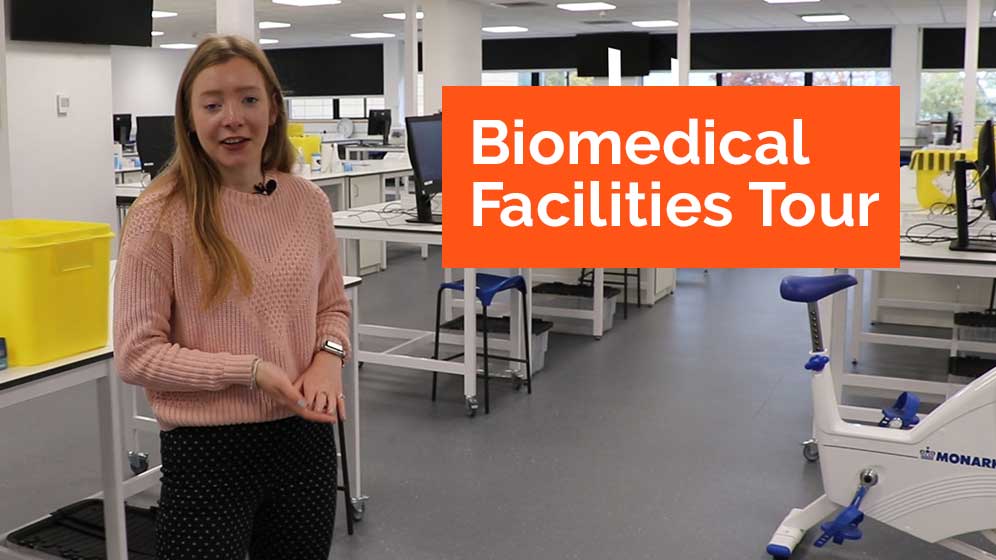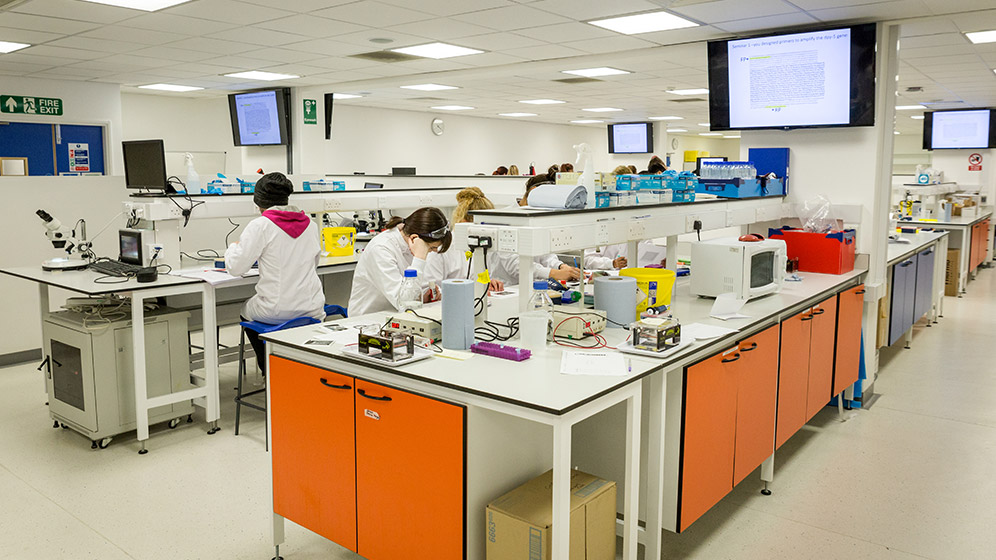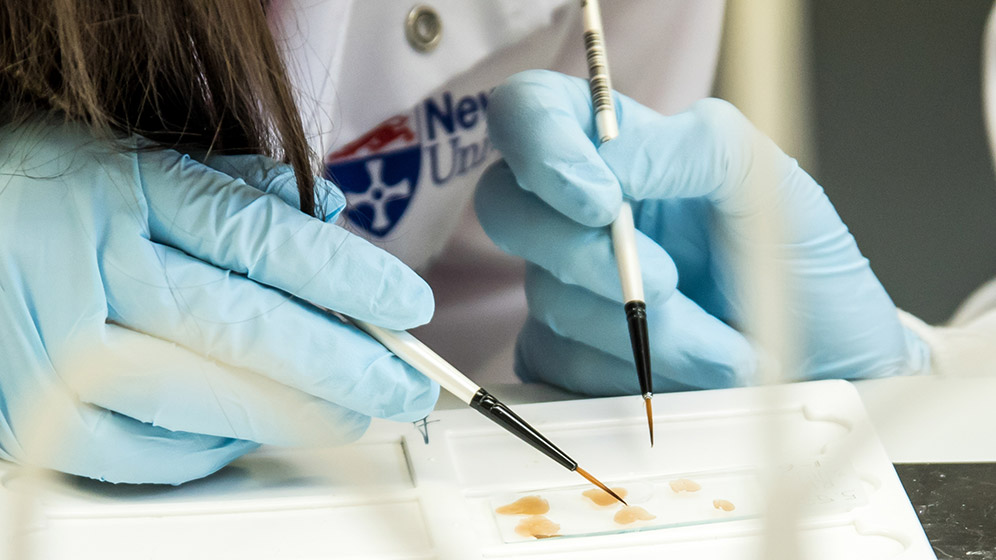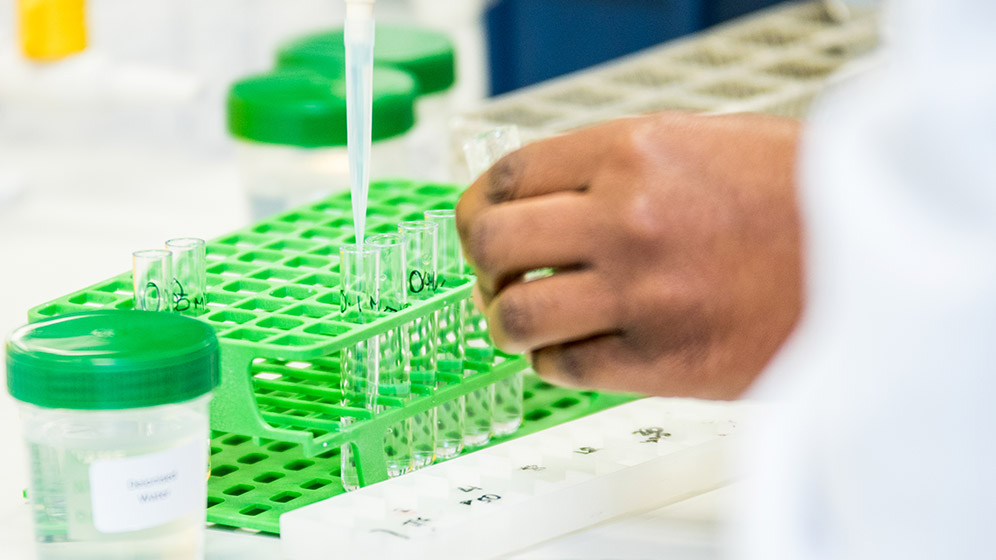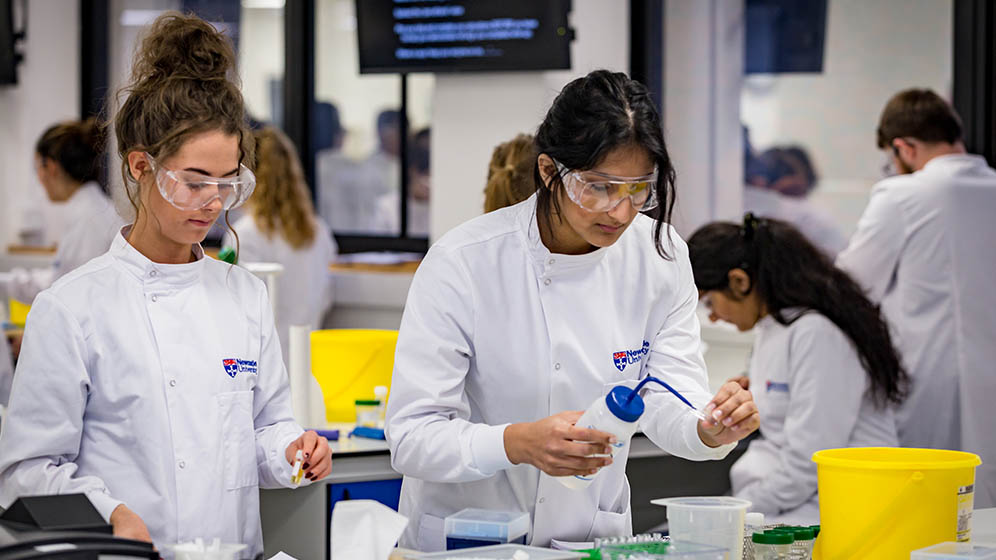Biomedical Sciences BSc Honours
- UCAS code: B940
- Full time
- 3 years
This accredited Biomedical Sciences degree explores the human body’s function in health and disease. It equips you with specialist knowledge about how diseases occur, and how researchers and clinicians develop new treatments.
You are currently viewing course information for entry year: 2026
Next start date:
- September 2026
UCAS Institution name and code:
- NEWC / N21
Course overview
This degree develops your understanding of how the human body functions in health and disease, and ensures you graduate well prepared to make a difference in modern biomedical research and/or medicine.
We're a National Centre of Excellence in biomedical research and our expert staff teach at all levels on our degree programmes. This means you graduate with the latest knowledge in human health and disease.
You’ll explore the links between:
- anatomy
- biochemistry
- genetics
- immunology
- microbiology
- neuroscience
- pharmacology
- physiology
By gaining an understanding of research in these areas, you'll learn how we can develop either preventative approaches or new treatments for a range of common diseases, such as Alzheimer’s, autoimmunity, cancer, and diabetes.
BSc or MSci?
Some of our degrees are offered at two levels:
- three-year Bachelor of Science (BSc)
- four-year Master in Science (MSci)
Our MSci degrees include an additional year of advanced study at master’s level, where you will gain additional research and practical experience to increase your employability and have the opportunity to work alongside our world-leading experts.
READ MORE
Your course and study experience - disclaimers and terms and conditions
Please rest assured we make all reasonable efforts to provide you with the programmes, services and facilities described. However, it may be necessary to make changes due to significant disruption, for example in response to Covid-19.
View our Academic experience page, which gives information about your Newcastle University study experience for the academic year 2025-26.
See our terms and conditions and student complaints information, which gives details of circumstances that may lead to changes to programmes, modules or University services.
Quality and ranking
Professional accreditation and recognition
All professional accreditations are reviewed regularly by their professional body.
Additional information
Transfer to our Medicine or Dentistry degree
There is flexibility to transfer between our degree programmes at the end of the first year if you find your interests change.
You can also apply to transfer to our Medicine or Dentistry degree. This opportunity is open to UK, EU and international students. It is competitive, with a limited number of places available. Students are selected on the basis of academic performance in the first year, a UCAT score, a personal statement and, if shortlisted, an interview.
Modules and learning
Modules
The information below is intended to provide an example of what you will study.
Most degrees are divided into stages. Each stage lasts for one academic year, and you'll complete modules totalling 120 credits by the end of each stage.
Our teaching is informed by research. Course content may change periodically to reflect developments in the discipline, the requirements of external bodies and partners, and student feedback.
Optional module availability
Student demand for optional modules may affect availability.
Full details of the modules on offer will be published through the Programme Regulations and Specifications ahead of each academic year. This usually happens in May.
To find out more please see our terms and conditions
The first two semesters of our programme and subsequent core modules are designed to give students a core knowledge and understanding of biomedical sciences. The rest of the programme aims to develop students’ knowledge of the breadth and scope of biomedical sciences, with exciting modules in cutting-edge areas, and an in-depth knowledge of research skills.
Stage 1
You're introduced to biomolecular sciences through a series of modules.
These modules will be active for those students starting the programme in September 2026.
| Compulsory modules | Credits |
|---|---|
| Molecules of Life | 20 |
| Infectious Threats | 20 |
| Core Skills in Biosciences | 20 |
| Core Concepts in Biosciences | 20 |
| Therapeutic Mechanisms | 20 |
| Cells to Systems | 20 |
These modules will be active for those students starting the programme in September 2026.
| Compulsory modules | Credits |
|---|---|
| Skills for Bioscientists: Techniques, Tools, and Applications | 20 |
| Genomics and Gene expression in Disease | 20 |
| Anatomy and Cellular Systems | 20 |
You'll take one optional module from each of the following lists.
List 1A:
List 2A:
List 2B:
You'll complete a research project in an area linked to your degree that interests you.
You'll select a module designed to boost your professional skills in a relevant employment area.
These modules will be active for those students starting the programme in September 2026.
| Compulsory modules | Credits |
|---|---|
| Becoming a Bioscientist: Skills for Research and Beyond | 20 |
You'll take one of the following compulsory modules:
| Compulsory modules | Credits |
|---|---|
| Research Project | 40 |
| Research Project Overseas | 40 |
You take one optional module from each of the following lists:
List A:
List B:
List C:
We base these figures and graphs on the most up-to-date information available to us. They are based on the modules chosen by our students in 2024-25.
Teaching time is made up of:
- scheduled learning and teaching activities. These are timetabled activities with a member of staff present.
- structured guided learning. These are activities developed by staff to support engagement with module learning. Students or groups of students undertake these activities without direct staff participation or supervision
Teaching and assessment
Teaching methods
You'll learn through a combination of lectures, practical laboratory classes and small group seminars.
Assessment methods
You'll be assessed through a combination of:
-
Assessments
-
Case studies
-
Coursework
-
Dissertation or research project
-
Essays
-
Examinations – practical or online
-
Group work
-
Practical sessions
-
Presentations
-
Reports
-
Seminar tasks/exercises
Skills and experience
Professional skills
Our programme has been designed with your future career path in mind, alongside employers. This will boost your professional skills in an employment area that we know many of our graduates progress to, for example:
- Business Enterprise for the Bioscientist
- Research in Biomedical Sciences
- Healthcare Organisation and Practice
- Science Communication
- Bioethics
- Bioinformatics
Opportunities
Study abroad
Experience life in another country by choosing to study abroad as part of your degree. We offer a wide range of destinations and opportunities for students, and we can help you decide which option would work for you (including free language courses before you go, and helping you apply for funding). You’ll be encouraged to embrace fun and challenging experiences, make connections with new communities and graduate as a globally aware professional, ready for your future.
You can choose to spend up to a year studying at a partner institution overseas. You can even take a summer placement in an overseas research laboratory.
Find out more about study abroad
Work placement
Get career ready with a work placement and leave as a confident professional in your field. You can apply to spend 9 to 12 months working in any organisation in the world, and receive University support from our dedicated team to secure your dream placement. Work placements take place between stages 2 and 3.
You'll gain first-hand experience of working in the sector, putting your learning into practice and developing your professional expertise.
If you choose to take a work placement, it will extend your degree by a year, and your degree title will show you have achieved the placement year. A work placement is not available if you're spending a year studying abroad. Placements are subject to availability.
Facilities and environment
Facilities
You'll be based in the School of Biomedical, Nutritional and Sport Sciences in the Faculty of Medical Sciences at our city-centre campus. The Faculty is also home to Dentistry, Medicine, Psychology and Pharmacy, making it a vibrant environment for learning and research.
Our facilities include:
- a dedicated medical library with a wide range of specialist books and journals
- spacious modern teaching laboratories
- hi-tech computer clusters and study spaces
- cutting-edge research laboratories and equipment facilities
- flexible student social spaces
- being less than two minutes’ walk of the sports centre
Find out about the School of Biomedical, Nutritional and Sport Sciences
Support
You'll have the support of an academic member of staff as a personal tutor throughout your degree to help with academic and personal issues.
Peer mentors will help you in your first year. They are fellow students who can help you settle in and answer any questions you have, when starting university.
We have study skills ambassadors; peers who can help you with your studies including maths support.
We also have Phase Advisors who monitor your academic progress, and in-school Wellbeing Advisors who can help you manage issues affecting you during your studies.
Your future
There is a great demand for graduates in the biomedical and biomolecular sciences within the health services and industry, particularly leading or working as part of research teams, and many of our students choose this career path.
A large proportion of our graduates choose to take a further degree either a medical, master's, PhD or teaching qualification, before embarking on permanent employment.
Recent Biomedical and Biomolecular Sciences BSc and MSci Honours graduates have taken up roles such as:
- clinical specialist
- laboratory analyst
- research technician
- clinical data associate
- trainee clinical scientist
- research PhD student
- medical writer
Work in a range of industries
Sectors employing bioscientists include:
- pharmaceuticals
- biotechnology
- education
- healthcare
- chemical
- cosmetics and toiletries
- food and drink
- scientific writing
- research and development
- patent law
- business analysis
- software engineering
- clinical trials management
Find out more about the career options for Biomedical and Biomolecular Sciences from Prospects: The UK's Official Careers Website.
Learn about the careers our graduates have pursued on the School of Biomedical, Nutritional and Sport Sciences website.
Make a difference
Sorry, you need JavaScript to view this video
Careers support
Throughout your studies, there will be many opportunities to engage with industry including:
- site visits
- guest lectures
- employability fairs
- industrial placements
- internships
- advice from industry
Develop your employability with the support of the School through:
- summer placements
- internship opportunities
- opportunities to participate in clinical work shadowing
- becoming a student rep or ambassador
- mock interviews
- CV interviews
- careers clinics
- earning open badges
- enterprise challenge events
- assistance with applying to medicine/dentistry/postgraduate study
Our Careers Service is one of the largest and best in the country, and we have strong links with employers. We provide an extensive range of opportunities to all students through our ncl+ initiative.
Visit our Careers Service website
Recognition of professional qualifications outside of the UK
If you’re studying an accredited degree and thinking about working in Europe after you graduate, the best place to find current information is the UK Government’s guidance on recognition of UK professional qualifications in EU member states. This official resource explains whether your profession is regulated in another country, what steps you need to take, and which organisation you should contact.
Entry requirements
All candidates are considered on an individual basis and we accept a broad range of qualifications.
The entrance requirements and offers below apply to 2026 entry.
| A-Level | |
|---|---|
| International Baccalaureate | |
|---|---|
Other UK and the Republic of Ireland qualifications
Alternative offers at Newcastle
Through one of our contextual or alternative offer routes, you could receive an offer of up to three grades lower than the typical requirements.
Contextual offers
We use certain contextual data from your UCAS form, alongside your application, to consider challenges that you may have faced in your education and the potential effect this may have had on your qualifications. This means you may be eligible to receive a lower contextual offer.
PARTNERS offers
One of the largest and longest support entry routes to university of its kind for students from underrepresented backgrounds. We support applicants from application through to study.
Realising Opportunities offers
A unique programme delivered in collaboration with 10 leading, research-intensive universities in the UK. The programme is open to students in Year 12/first year of college.
Pathways to Newcastle offers
Pathways to Newcastle, our national skills entry route, is available for specific subject areas.
High Performance Athletes
We support promising athletes at the application stage, who compete in regional, national or international levels in their sport.
Qualifications from outside the UK
English Language requirements
Entrance courses (INTO)
International Pathway courses are specialist programmes designed for international students who want to study in the UK. We provide a range of study options for international students in partnership with INTO.
These courses are specifically designed for international students who want to study in the UK and progress onto one of our undergraduate degrees. Our International Study Centre, has a range of study options including:
- International Foundation
- International Year One
- English Language courses
Find out more about International Pathway courses
Admissions policy
This policy applies to all undergraduate and postgraduate admissions at Newcastle University. It is intended to provide information about our admissions policies and procedures to applicants and potential applicants, to their advisors and family members, and to staff of the University.
University Admissions Policy and related policies and procedures
Credit transfer and Recognition of Prior Learning
Recognition of Prior Learning (RPL) can allow you to convert existing relevant university-level knowledge, skills and experience into credits towards a qualification. Find out more about the RPL policy which may apply to this course.
Tuition fees and scholarships
Tuition fees for academic year 2026-2027
The 2026 entry home fees have not yet been confirmed.
| Qualification: BSc Honours | |
|---|---|
|
Home students full time 3 years |
Tuition fees (Year 1)
Not set |
|
International students full time 3 years |
Tuition fees (Year 1)
30,900 |
Year abroad and additional costs
For programmes where you can spend a year on a work placement or studying abroad, you will receive a significant fee reduction for that year.
Some of our degrees involve additional costs which are not covered by your tuition fees.
Scholarships
Find out more about:
Open days and events
You'll have a number of opportunities to meet us throughout the year at our on-campus and virtual open days.
You'll be able to:
- explore our beautiful campus
- find out about our vibrant city
- discover what students think about studying at Newcastle
You'll also have the opportunity to speak to academic staff and find out more about the subjects you're interested in.
Find out about how you can visit Newcastle in person and virtually.
We regularly travel overseas to meet with students interested in studying at Newcastle University. Visit our events calendar to find out when we're visiting your region.
How to apply
Apply through UCAS
To apply for undergraduate study at Newcastle University, you must use the online application system managed by the Universities and Colleges Admissions Service (UCAS). All UK schools and colleges, and a small number of EU and international establishments, are registered with UCAS. You will need:
- the UCAS name and institution codes for Newcastle University (NEWC/N21)
- the UCAS code for the course you want to apply for
- the UCAS 'buzzword' for your school or college
If you are applying independently, or are applying from a school or college which is not registered to manage applications, you will still use the Apply system. You will not need a buzzword.
Apply through UCASApply through an agent
International students often apply to us through an agent. Have a look at our recommended agents and get in touch with them.
Get in touch
By phone
Call us on +44 (0) 191 208 3333 and press option 1. Our opening hours are Monday to Friday 10am until 4pm.
Live chat
Our NCL chatbot might be able to give you an answer straight away. If not, it’ll direct you to someone who can help.
You'll find our NCL chatbot in the bottom right of this page.
Online
Chat to our students
Choosing a university is a big decision. If you've got questions about a particular course, student life or the city of Newcastle, why not chat to our friendly students or graduates!
Keep updated
We regularly send email updates and extra information about the University.
Receive regular updates by email









